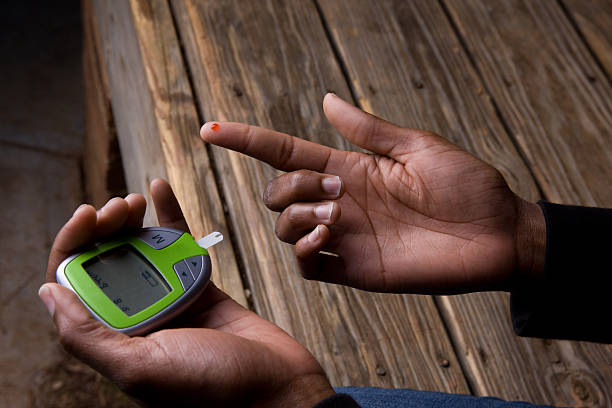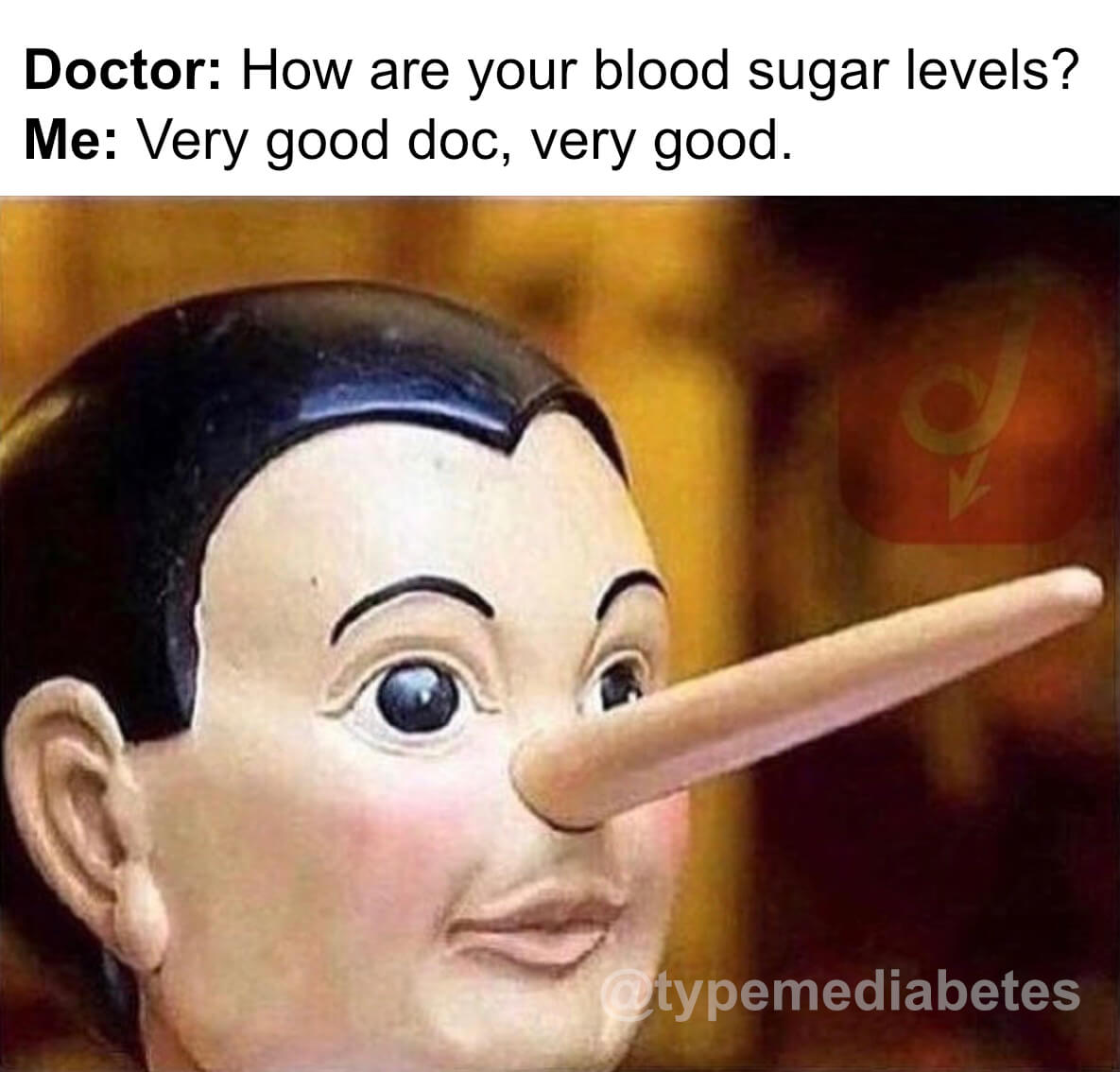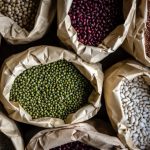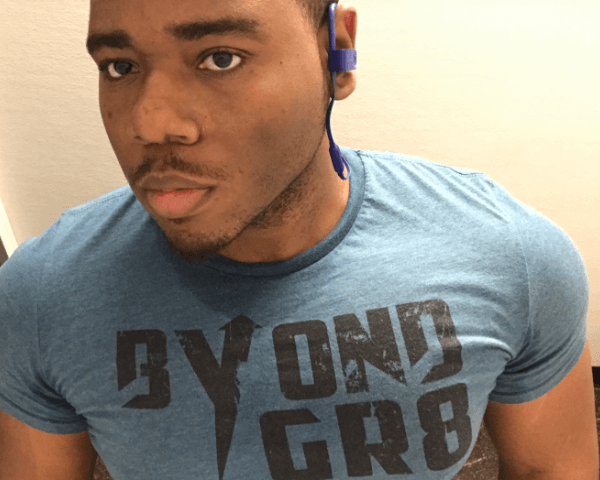I Lied To My Doctor About My Blood Sugar Levels

In my teenage years, I didn’t understand the importance of close blood glucose monitoring. Most of the time I felt fine so I would hardly check my blood sugar. With school, sports and girls occupying most of my time, diabetes management was the furtherest thing from my mind. I wanted to feel normal and there was always a sense of denial looming over me. My testing frequency was something like two or three times a week which thinking about it now was really ridiculous.
My doctor would usually require me to do a few days of testing at specific intervals so she could determine the efficiency of my treatment plan. Was my insulin dosage enough? Was my nutrition on point? My doctor relied on this critical information to help assess my situation. I remember sitting the night before a doctor’s appointment filling in the blank record spots with fictitious blood sugar readings. I tried to make up numbers that would sound realistic and also show that I was in a good range most of the time. The sad thing is that I did this for many doctor visits.

Looking back at my indiscretions, so many things could have gone completely haywire. I could have developed serious complications from poor blood sugar control or even worse I could have died. Some people may think this is an exaggeration, but insulin is an extremely sensitive medication. Too much of it can actually kill you. I’ve been in a diabetic coma as a result of too much insulin and I’ve also witnessed this happen to family members. Believe me, these experiences were pretty scary. It’s a miracle that we all have not developed any issues or complications as a result.
The Effects of Glucose on the Brain
Glucose is the primary source of energy for every cell in the body. Because the brain is so rich in nerve cells, or neurons, it is the most energy-demanding organ, using one-half of all the sugar energy in the body.
Brain functions such as thinking, memory, and learning are closely linked to glucose levels and how efficiently the brain uses this fuel source. If there isn’t enough glucose in the brain, for example, neurotransmitters, the brain’s chemical messengers, are not produced and communication between neurons breaks down. In addition, hypoglycemia can lead to loss of energy for brain function and is linked to poor attention and cognitive function.
“The brain is dependent on sugar as its main fuel,” says Vera Novak, MD, PhD, an HMS associate professor of medicine at Beth Israel Deaconess Medical Center. “It cannot be without it.”
Although the brain needs glucose, too much of this energy source can be a bad thing. High blood glucose levels can affect the brain’s functional connectivity, which links brain regions that share functional properties, and brain matter. It can cause the brain to atrophy or shrink. And it can lead to small-vessel disease, which restricts blood flow in the brain, causing cognitive difficulties and, if severe enough, spurring the development of vascular dementia.
http://neuro.hms.harvard.edu/harvard-mahoney-neuroscience-institute/brain-newsletter/and-brain-series/sugar-and-brain
It wasn’t until my late teens that I finally got a wake up call. I attended a doctor’s appointment and was confronted with a harsh reality and one of my biggest fears. I saw diabetic patients who had their legs amputated and others who where placed on dialysis as a result of kidney failure. I decided right there and then that I would not end up in that predicament. I would do everything I could to get as healthy as possible and control my blood sugar levels.
From that moment on I always completely honest with my doctor. I also detailed all of my health and blood sugar issues meticulously. I would use the below table to record my readings for several days to analyze my treatment plan. My doctor became an integral part of this treatment plan. Adding exercise to the mix and adjusting my diet also assisted tremendously.
| Date | Fasting Blood Sugar | Breakfast Meal | Blood Sugar 2 Hours After Breakfast | Mid Morning Snack | blood Sugar Before Lunch | Lunch Meal |
| 2 Hours After Lunch | Evening Snack | Blood Sugar Before Dinner | Dinner Meal | 2 Hours After Dinner | Night Snack | Bedtime Blood Sugar |
TIP: never delay treating a high blood sugar. As soon as you exhibit symptoms of hyperglycemia, check your blood sugar to verify and treat accordingly. Correcting a hyper immediately can assist in preventing several complications in the future. Each time your blood sugar goes high (above 8 mmol/L) your organs are placed under extra stress and will not function efficiently.
Any person living with diabetes should be able to communicate with his or her doctor to develop effective treatment solutions. You should never feel belittled by your doctor for having diabetes or have your treatment efforts belittled. If you are trying your best but not doing so well you should be able to confide in your doctor and not feel ashamed. It’s always a great idea to see a diabetes specialist. If you have toothache you go to a dentist and if you have a heart issue you go to a cardiologist. Therefore, if you have diabetes, why not get the best care for yourself?
I urge all diabetics to treat their blood sugar control with utmost importance. A few more high blood sugars here and there can be the difference in quality years with your family in the future.
Take a look at these Diabetes Management Tips from Dr. Laura Layne.
Five best diabetes management tips:
Find out how well your diabetes is controlled.
Current degree of diabetes control influences future risk of complications. The level of current control is estimated using the HbA1C value which measures blood sugar control over the past 90 days. This can then be used by your doctor to plan for other tests and change of medications and other adjustments to management.
Let persons around you know that you have diabetes
Far too often, many persons are scared to tell others that they live with diabetes for fear of stigmatization and opinions. However, this knowledge could save your life. If others around know what to do in cases of certain diabetic emergencies, a better outcome is likely.
Talk to your doctor (candidly)
Let your doctor know the challenges and struggles you may face in dealing with this disease. Chances are, you are not the only patient that they may have seen with your concerns and they can calm your fears and how you can best address them.
Understand how your diet can affect your goals
Diabetes and your diet (how you eat rather than a restrictive ‘diet’) is too often overlooked on the road to optimal control. A dietitian or nutritionist is the best person to discuss this with as they can guide you on how to include all of your favorite foods into your longterm plan to achieve good diabetes control.
Talk to your doctor before adding any herbal medications
Many herbal medications and plants are often seen as “natural” alternatives to lowering blood glucose. I often ask the question to patients; how much of what plant of what species is required? Most persons give varying answers showing there is no way to see exactly what is the best amount of these to use. In addition, when combined with traditional medications, they can produce certain side effects, depending on the alternative treatment selected. Therefore, this should be discussed with your doctor. Certain natural additions to diet, such as increasing fiber rich foods, use of low glycemic index foods etc. is useful in blood glucose control and is therefore a better alternative.





 My name is Christopher and I am a type 1 diabetic. I was diagnosed at age 6 in 1993 and with good management I have been healthy and complication free to date. Like most persons living with type 1 diabetes, I have had my ups and downs, daily struggles and issues. However, I intend to live my life to the fullest and I will not let diabetes get in my way.
My name is Christopher and I am a type 1 diabetic. I was diagnosed at age 6 in 1993 and with good management I have been healthy and complication free to date. Like most persons living with type 1 diabetes, I have had my ups and downs, daily struggles and issues. However, I intend to live my life to the fullest and I will not let diabetes get in my way.




Leave a Reply
Be the First to Comment!